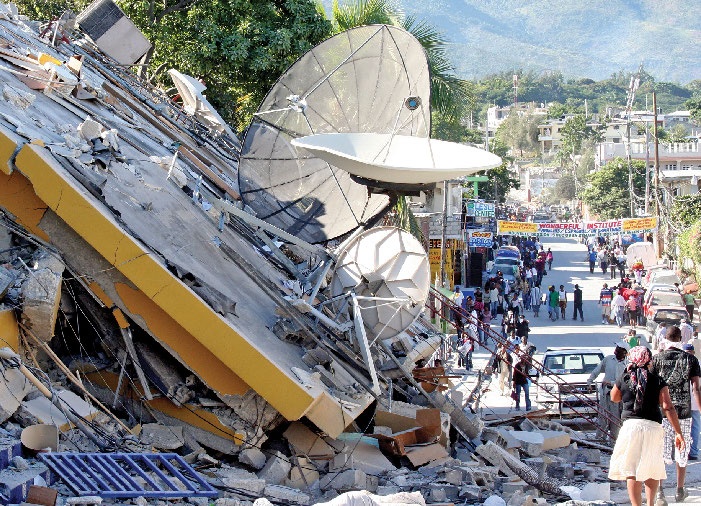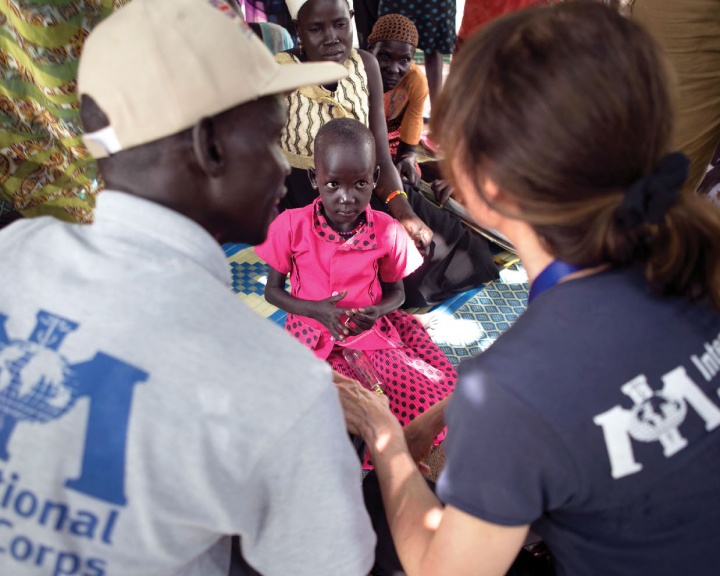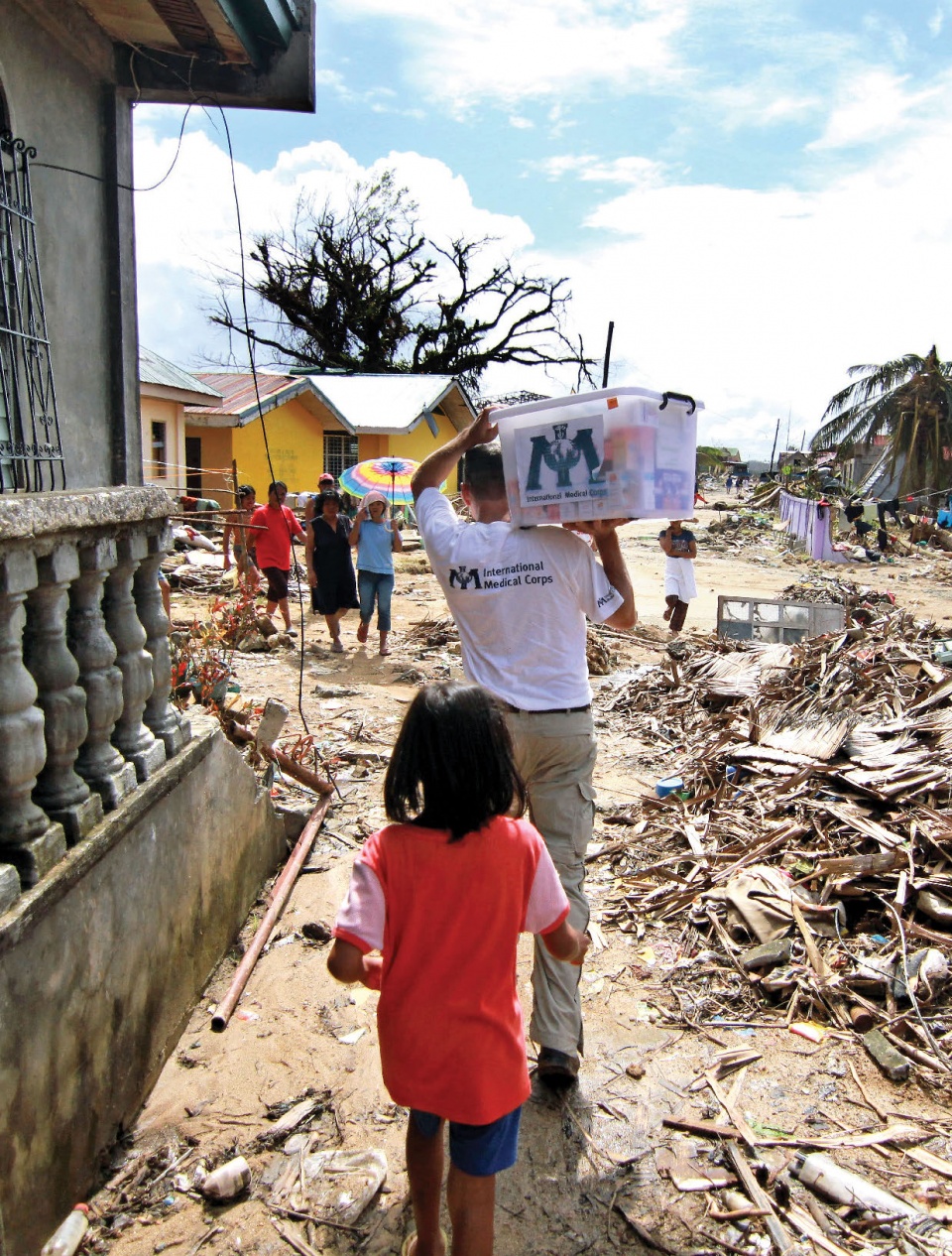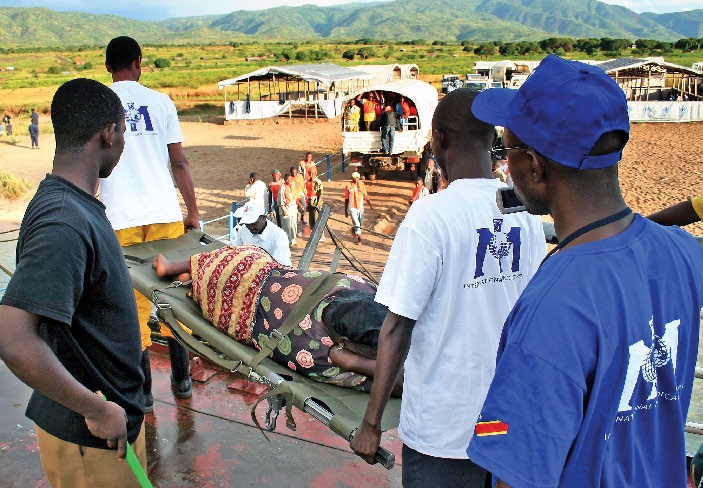Margaret Traub ’88 experiences “the best and worst humanity has to offer, side by side,” doing on-the-ground disaster relief
Columbia College | Columbia University in the City of New York
Margaret Traub ’88 experiences “the best and worst humanity has to offer, side by side,” doing on-the-ground disaster relief
When news of the 2010 earthquake in Haiti broke, Margaret Traub ’88 was sitting in a Los Angeles meeting room with her colleagues at International Medical Corps, where she was the nonprofit’s head of global communications. She found out about the disaster via email, “and I knew right away how important it was,” she recalls. “As the poorest nation in the Western hemisphere, their infrastructure would be devastated.”
Traub cut the meeting short to begin gathering information, and it quickly became clear that IMC’s emergency services would be crucial in Haiti’s capital, which had been leveled by the magnitude 7 quake. The IMC, a humanitarian nonprofit founded by doctors and nurses in 1984, works in 30 countries administering healthcare, training local workers, and alleviating famine and poverty through both long-planned public health initiatives and short-notice relief work. Traub, a former journalist, was in charge of issuing public statements and communications about the organization’s relief missions, so she quickly jumped into action.
“We discovered 200 people injured in the parking lot. I’m not a doctor,
but I was helping triage and move people around, helping out however I could.”
By 9 p.m., Traub was in midair, en route to D.C. She landed at Dulles at dawn; met up with her colleagues in operations, programs and security; flew to Miami; and, after some discussions about planning and logistics — Would it be possible to get to Haiti via the Dominican Republic? Were the airports open? What state were the roads in? — opted to fly direct. Her team claimed seats on the last connecting flight to Port-au-Prince.

A destroyed TV station in Port-au-Prince, Haiti, two days after the 2010 earthquake. International Medical Corps’ Emergency Response Team was delivering relief within 24 hours of the quake.
Photographs by Margaret Traub
It wouldn’t be a stretch to say that Traub’s career up until this point was a drawn-out prep session for this mission to Haiti. She’d spent more than a decade as a TV journalist, first at Good Morning America, then as an executive producer at CNN, so she was used to responding to events in faraway places. The pace of the news business is relentless, so the adrenaline rush that comes with thinking fast and moving quickly to deal with an emergency was familiar to her, too. Traveling to Haiti, albeit under such treacherous circumstances, was also meaningful on an intellectual level: as a senior at the College, Traub had written her political science thesis on the small Caribbean nation. “I’d always wanted to go there and when the earthquake happened and I was on the ground the following day, I remember thinking, ‘I can’t believe I’m finally coming to this country that I’ve studied for so long.’”
As prepared as she might have been on paper, the scale of the devastation was unimaginable. Everywhere she turned, there were people close to death. No building, no family, no form of life was spared. “When we landed, we started driving to a hotel that wasn’t apparently so damaged, but we discovered 200 people injured in the parking lot,” she says. “I’m not a doctor, but I was helping triage and move people around. I was doing logistical stuff, impromptu pharmacy and helping out however I could.”
She also found herself on the other side of the camera, explaining to journalists what was going on, making sure they had the right information, even talking them into asking viewers to donate to IMC. “I’ve developed quite a jaundiced view of TV. I see all the strings off the puppetry, off the marionettes,” she says. “I see how they make mistakes and it frustrates me. At the same time, it’s a bit of self-regret because I was one of them: I did not know the humanitarian world.”

Nyal, South Sudan, 2017: A crippling civil war has displaced two million people, putting them at risk of starvation and disease.
To be fair, most people know little about what it’s like to work at a humanitarian organization: We see TV advertisements asking for donations and hear snippets about the heroism of first-responders but have no sense of the day-to-day tasks involved. Participating in that work firsthand was eye-opening for Traub. Before, aid workers might have briefly been the subjects of the stories she produced; working among them helped her tap into her more compassionate side. “I remember thinking, I’ve never been around people like this. I’ve never seen or experienced anything like this,” she recalls.
It also marked a significant shift from her previous role as an impartial observer and reporter. Being in a position where it was her job to comfort people and lend a hand, rather than to abide by journalistic standards and stand behind, was gratifying. “Your job is to do something,” she says.
Traub’s road to IMC was a winding one. Born in Chicago to native New Yorkers, her father, a psychotherapist who studied in Vienna, moved his family to a suburb of Salt Lake City when she was a child. They hiked, fished, skied and hunted in an idyllic landscape, but “it was very much a fish-out-of-water scenario,” she recalls. “Going to Catholic high school, I was being exposed to religious practices that I didn’t practice, and tenets that I didn’t abide by.
“And I didn’t look like everyone,” she adds, laughing.“I had dark curly hair and a big nose, and everyone else was blond.” As soon as she graduated from high school, she was on her way to New York, where she’d dreamed of living for as long as she could remember.
Columbia was challenging for Traub in a way that many students can identify with. “I was so intimidated by these extraordinary achievers. I was the number 1 tennis player in the state in high school, and a concert pianist; I thought that I would be extraordinary. But when I got to Columbia, I was surrounded by people who did everything I did and more.” After a couple of semesters of hard partying — a reaction, she says, to Utah’s stifling conservatism — Traub began thinking about her career. Should she become a journalist, as she’d always intended, or go to law school? A depressing stint as a paralegal made the decision for her. After an internship at NBC, she became a stringer for the Associated Press, a writer for Good Morning America and a producer at CNN.
By 2001, Traub was living in TriBeCa and had what many aspiring journalists would consider a dream job as an executive producer at CNN. Then, 9-11 happened, and the cascade of events that followed compelled her to change her life in a major way — initially because she felt unable to maintain journalistic professionalism amid the hardship that was literally six blocks from her home. “I remember having a hard time depersonalizing the news,” she says. “All the news we were covering started to shake me and it was becoming harder to cover stories dispassionately. I started feeling really burned out.”

International Medical Corps delivered medical relief to the people of Hernani, in the Philippines, following 2013’s Typhoon Haiyan.
When her malaise didn’t subside, Traub’s then-husband suggested a move to Los Angeles. She went, planning to give the entertainment industry a try, but “I found TV development in L.A. to be completely soul deadening,” she says. “After putting on hundreds of hours of TV every day [at CNN], I was developing shows that after a year hadn’t even seen the light of day for half an hour.”
Dealing with the Hollywood culture was diffcult, too. “New York is straightforward and if people don’t like something, they tell you. In L.A., yes means no and no means maybe and maybe means yes.” On the recommendation of a former CNN colleague, she interviewed with IMC, and when the CEO offered her a job just days after the initial conversation, she accepted on the spot.
Within a few months, “my view of the world had completely changed. As an executive in a control room, I had a very Western view. We didn’t cover stories about Africa and parts of Asia and South America; many news organizations don’t.” By the time a year had passed, Traub — who’d never been to Africa, or any developing nation, for that matter — had traveled to Uganda, Ethiopia and the Democratic Republic of the Congo.
“I’m fearless now about some things I didn’t used to be.
I have very little tolerance for bullshit — office bullshit,
machinations of our day-to-day lives.”
The DRC in particular made Traub realize just how much information doesn’t come through in a TV spot or news article. When she went in 2007, she was aware of the country because of a much-publicized “rape epidemic”; she did not expect to emerge from her travels a changed, inspired person. “The rollercoaster of emotions and experiences was intense: It’s one of the most stunningly beautiful places I’ve seen, but the suffering is so tremendous. And speaking with women who’ve been raped in such a violent way, with the butts of guns, with objects being put inside them — understanding human motivation and seeing the best and the worst humanity has to offer side by side on a daily basis broadened my view of the world and of the human experience.”
Traub is now IMC’s head of global initiatives, which involves on-the-ground disaster relief, as well as promoting the organization’s global ambassadors — actresses Robin Wright and Sienna Miller, to name just two — and cultivating partnerships with Fortune 500 companies. She’s happier than she was as a journalist, she says, in part because there’s less day-to-day politicking and power grabbing. “I’m not a very good political animal,” she says.

Uvira, eastern Congo, 2007: International Medical Corps assisted Congolese refugees who were returning to their homeland after having fled to Tanzania for safety.
Wading into warzones and disaster areas can be emotionally traumatic, of course, and Traub says she’s still uncovering the consequences of it today. “I felt the reverberations of what I saw subsequently over the years — there are multitudinous reasons for the end of a marriage but it played a role [in mine].” But she feels it’s made her stronger.“I’m fearless now about some things I didn’t used to be. I have very little tolerance for bullshit — office bullshit, machinations of our day-to-day lives.
“When you’re in a place where people don’t have food and malnutrition is through the roof, and you come home and the choices are abundant, you start to say, ‘I’m not going to worry about this anymore! I’m not going to worry about something with my boss, or that I was just in a fender bender.’ They seem to pale in comparison.”
Traub also finds humanitarian work more meaningful than TV journalism. “My values over the years have evolved,” she notes. “What was important to me at CNN was success in my career, my title, money and ratings, and love and personal stuff of course — but I was focused on winning the game.
“I now work in a place where we’re not tree huggers — actually, we’re a pretty cynical bunch — but we all work together toward a common mission. My work is moving the ball down the road toward helping human existence be better. It’s a nicer place to be.”
Atossa Araxia Abrahamian ’08, JRN’11 authored The Cosmopolites: The Coming of the Global Citizen.

Published three times a year by Columbia College for alumni, students, faculty, parents and friends.
Columbia Alumni Center
622 W. 113th St., MC 4530, 6th Fl.
New York, NY 10025
212-851-7852
cct@columbia.edu

Columbia Alumni Center
622 W. 113th St., MC 4530, 4th Fl.
New York, NY 10025
212-851-7488
ccalumni@columbia.edu